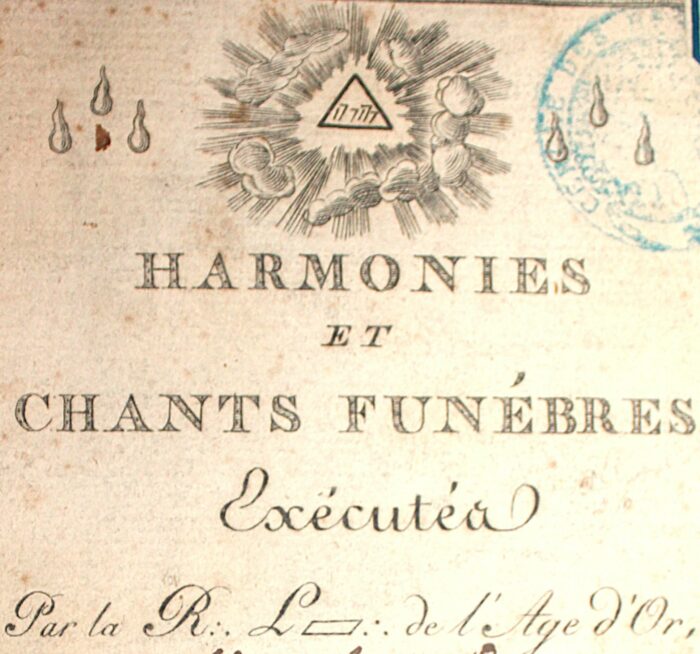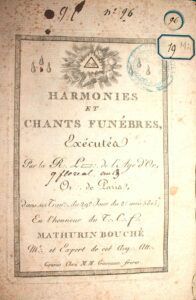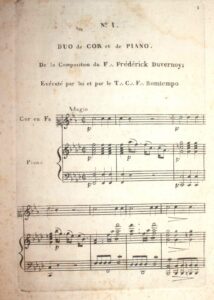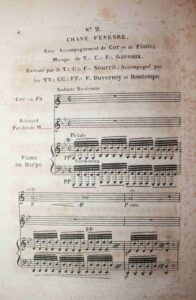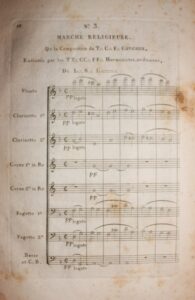Pierre Gaveaux and Frédérick Duvernoy. Harmonies et Chants funèbres, exécutés par la R∴ L▭∴ de l’Age d’Or, Or∴ de Paris, dans ses Travx∴ du 29e Jour du 2e mois 5805 ; En l’honneur du T∴ C∴ F∴ Mathurin Bouché Me∴ et Expert de cet Aug∴ Att∴ [Paris], engraved by M.M. Gaveaux frères, no date [1805]. In-8°. Engraved title serving as cover and 20 pp. of engraved music. Sewn together.
Very rare publication of Masonic music to accompany a funeral service at the beginning of the Empire. Only 1 copy listed in the CCFr, kept at the BNF.
The engraved, framed title is decorated with funereal Masonic symbols: repeated silver tears in the frame and triple silver tears on either side of the luminous delta. The date of the vulgar republican era has been added in ink: « 9 floréal an 13 », that is, on 29 April 1805.
The collection includes a Duo for horn and piano composed by F∴ Fr. Duvernoy and performed by F∴ Bomtempo (pp 1-5), adagio in F minor followed by a 6/8 gratioso in F Major.
This is followed by a Chant funèbre with horn and piano accompaniment composed by F∴ P. Gaveaux, performed by F∴ Nourrit, accompanied by Duvernoy and Bomtempo, the piano part being able to be played on the harp (pp 6-15): recitative andante sostenuto in G minor followed by 3 couplets andante à 2/4 in C minor.
Finally, the ceremony ends with a Religious March in D minor composed by P. Gaveaux, performed by the TT∴ CC∴ FF∴ “harmonistes-ordinaires” of L∴ R∴ L▭∴ : 1 flute, 2 clarinets, 2 horns in D, 2 bassoons, and a bass and contrabass.
We have very little information about the Parisian Golden Age Lodge. Bésuchet reports that it was founded on 9 September 1783. Le Bihan states that the request for constitution presented on 9 December 1783 was accepted on 4 February and the installation took place on the following 16 March. Activity resumed in March 1802.
Pierre Gaveaux, (Béziers, 1760 – Vanves, 1825), French singer and composer, was first tenor in French opera, at the Théâtre de Monsieur in the Salle des Machines in the Tuileries Palace, which he inaugurated on 26 January 1789. When the royal family left Versailles to come to Paris, he performed at the Foire Saint-Germain, during the construction of the Salle Feydeau, where he premiered the role of Floresky in Cherubini’s Lodoïska on 18 July 1791. The creator of many other roles, and composer of songs (Réveil du peuple) and operas (Léonore ou l’Amour conjugal), he was appointed singer in the Emperor’s chapel in 1804.
Frédéric Duvernoy (Montbéliard, 1765 – Paris, 1838), French horn player, composer and teacher. A horn player in the Comédie italienne orchestra, then in the Garde nationale orchestra and finally a member of the Paris Opéra orchestra in 1797, where he became principal horn in 1799, then a member of the Emperor Napoleon I’s Chapel, he taught at the Paris Conservatoire from its creation in 1795, and in 1802 wrote a Méthode pour le cor, which is still used today. As a composer, he wrote mainly pieces for his instrument, concerti for horn and orchestra, études, symphonie concertante and chamber music.
João Domingos Bomtempo (Lisbonne, 1775 – Lisbonne, 1842), Portuguese composer, pianist, teacher and oboist. He was the first Portuguese composer to write symphonies and chamber music, and was also the first director of the Lisbon Conservatory. He moved to Paris in 1801, where in 1804 he began a career as a virtuoso pianist at the Salle Olympique under the direction of Kreuzer, and published his first works with Leduc, where his concertos and symphonies were well received. He left France in 1810.
Blue stamp of a Beaux-Arts circle whose location is too faded to be legible; library quotation ‘n° 96’ repeated in ink, and on two labels.
Bésuchet, Précis historique de l’ordre de la franc-maçonnerie depuis son introduction en France jusqu’en 1829, suivi d’une biographie des membres de l’ordre, les plus célèbres par leurs travaux, leurs écrits, ou par leur rang dans le monde depuis son origine jusqu’a nos jours, vol. I, p. 386. A. Le Bihan. Francs-Maçons parisiens du Grand Orient de France (Fin du XVIIIe siècle).
Back torn, brown stain on 4th cover and half of copy, spotting in corners, some foxing, loose seams.
500 €
